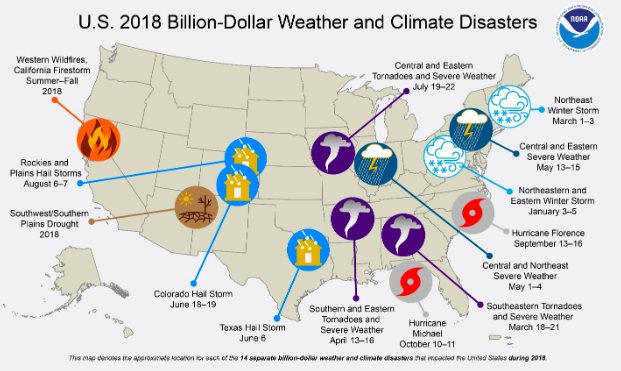
Graphic: NOAA
By Alexandra Patel and Monica Medina
According to a warning from top United Nations officials, climate-related disasters are now happening at a rate of one per week. Last weekend, in an interview with the Guardian, Mami Mizutori, the U.N. secretary-general’s special representative on disaster risk reduction, highlights that even though major catastrophes such as the drought currently afflicting India are making worldwide headlines, large numbers of “lower impact events”, that are also causing death, displacement, and suffering, and currently are being overlooked. The rate of climate-related disasters is also increasing in the U.S., according to a new report from the National Oceanic and Atmospheric Administration released yesterday, which said that from 2016 to 2018, the average number of billion-dollar disasters totaled 15 each year, while the average for 1980–2018 was just 6.2 events per year.
Why This Matters: Mizori summed up the problem saying, “We talk about a climate emergency and a climate crisis, but if we cannot confront this [the issue of adapting to the effects] we will not survive.” She does not mince her words, nor does she need to. Rich countries like the U.S., as well as developing ones, are feeling the effects of increased climate disasters. This is not just for future generations, but for the people living today, who are undeniable beginning to bear the burden of our warming planet. Mitigation efforts need to begin right away — we need to be much more aggressively leaning forward to prepare for climate events in order to both save lives and to save money.
The U.S. States With the Worst Record for Disasters
NOAA examined its climate data and found that four states have experienced the greatest number of disasters.
- Texas: According to NOAA, Texas stands “head and shoulders” above the rest — over NOAA’s 40 years of analysis, Texas has had more than 100 separate $1 billion disasters, from the Houston floods and hurricanes of 2017 to flooding and even winter storms.
- Florida: For Florida, the number of storms is not as great as other states (like Texas) but the disasters that hit — generally hurricanes — are extremely expensive.
- California: California’s wildfires and struggles with related air pollution make it among the riskiest places to live and work.
- Louisiana: Like Texas, Louisiana experiences “a very high frequency” of extreme weather events — the state gets hit so frequently that to locals it always feels like they are playing catch-up — they can’t recover from one storm before they are hit with another one.
The Cost of Prevention Versus Clean Up. Annual estimates put the global cost of climate-related disasters at $520 billion, “while the additional cost of building infrastructure that is resistant to the effects of global heating is only about 3 percent or $2.7 trillion in total over the next 20 years.” According to NOAA’s figures, in the U.S. the total cost of last year’s hurricanes, wildfires, floods, and other disasters was about $91 billion. By comparison, the cost of effective prevention is by far more economical than the cost of clean up and restoration after the fact. An independent study co-funded by FEMA in 2018 found that every $1 spent by the federal government on mitigation efforts saves an average of $6 in spending in the future. “This return on investment shows that investing now is an opportunity to reduce future disaster costs and accelerate recovery,” he said.
July 10, 2019 » adaptation, climate change, disaster, extreme weather, mitigation


